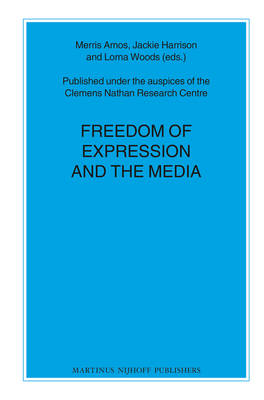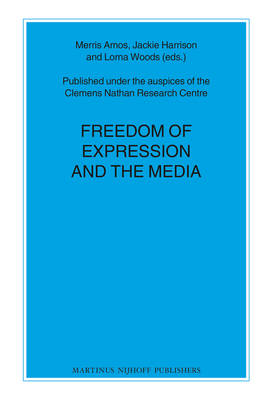
Bedankt voor het vertrouwen het afgelopen jaar! Om jou te bedanken bieden we GRATIS verzending (in België) aan op alles gedurende de hele maand januari.
- Afhalen na 1 uur in een winkel met voorraad
- In januari gratis thuislevering in België
- Ruim aanbod met 7 miljoen producten
Bedankt voor het vertrouwen het afgelopen jaar! Om jou te bedanken bieden we GRATIS verzending (in België) aan op alles gedurende de hele maand januari.
- Afhalen na 1 uur in een winkel met voorraad
- In januari gratis thuislevering in België
- Ruim aanbod met 7 miljoen producten
Zoeken
Freedom of Expression and the Media
€ 190,45
+ 380 punten
Omschrijving
Freedom of expression - particularly freedom of speech - is, in most Western liberal democracies, a well accepted and long established, though contested constitutional right or principle. Whilst based in ethical, rights-based and political theories such as those of: justice, the good life, personal autonomy, self determination, and welfare, as well as arrangements over legitimate government, pluralism and its limits, democracy and the extent and role of the state, there is always a lack of agreement over what precisely freedom of expression entails and how it should be applied. For the purposes of this book we are concerned with freedom of expression and the media with regard to the current application of legal standards and self-regulation to journalistic practice.
Specificaties
Betrokkenen
- Uitgeverij:
Inhoud
- Aantal bladzijden:
- 272
- Taal:
- Engels
- Reeks:
- Reeksnummer:
- nr. 79
Eigenschappen
- Productcode (EAN):
- 9789004207745
- Verschijningsdatum:
- 26/07/2012
- Uitvoering:
- Paperback
- Formaat:
- Trade paperback (VS)
- Afmetingen:
- 155 mm x 236 mm
- Gewicht:
- 430 g

Alleen bij Standaard Boekhandel
+ 380 punten op je klantenkaart van Standaard Boekhandel
Beoordelingen
We publiceren alleen reviews die voldoen aan de voorwaarden voor reviews. Bekijk onze voorwaarden voor reviews.








